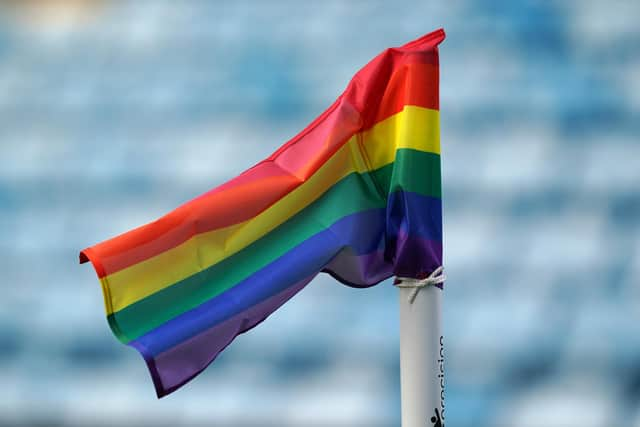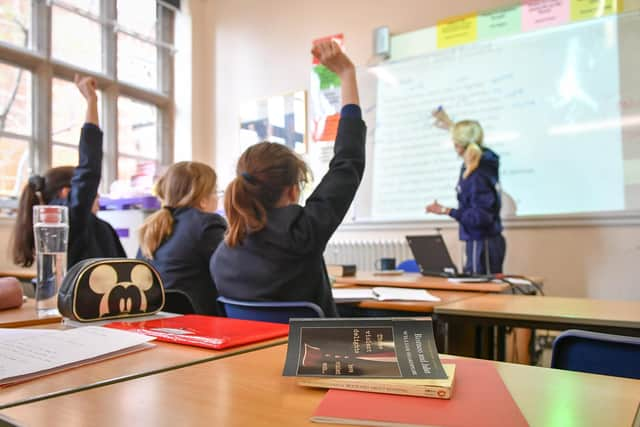LGBT History Month 2022: What is LGBT History Month and how to get involved in Scotland
As February begins, it’s time to celebrate the colourful history of the nation’s LGBT+ community.
Every February, the UK comes together to celebrate the history of its LGBT+ citizens and to raise awareness about ongoing issues still faced by the LGBT+ community.
Advertisement
Hide AdAdvertisement
Hide AdSpecial effort is also often made to acknowledge the unique history of certain groups within the LGBT+ community, such as but not limited to Black LGBT+ people and trans people.
Here’s everything you need to know about LGBT History Month 2022.
What is LGBT History Month?
Launched by the Schools Out charity in 2005, the event is credited with increasing the prominence of LGBT+ matters and figures in the curriculum of UK pupils.


The event was created in the wake of the abolition of Section 28 which stated that local authorities "shall not intentionally promote homosexuality or publish material with the intention of promoting homosexuality”.
The act was repealed in Scotland in 2000, and repealed three years later in England and Wales.
Coordinated by LGBT Youth Scotland, this year’s theme for LGBT History Month is ‘Blurring Borders: A World in Motion’.
“This year, it felt more important than ever to use LGBT History Month to demonstrate the strength of solidarity at home and around the world,” commented the chief executive of LGBT Youth Scotland, Mhairi Crawford.


Advertisement
Hide AdAdvertisement
Hide Ad“Globally, LGBT people and their allies are living through a fragile moment in history. Across Europe, there are efforts being made to roll back LGBT rights.
“Meanwhile, the UK has just been marked out by the Council of Europe as one among a few countries where rising anti-LGBT hate is of particular concern.
“By giving History Month an international focus, we’re inviting people and organisations across Scotland to share their ideas about what an equal world for LGBT people would really look like – and how we can work together to achieve it.”
The month-long celebration aims to increase the visibility of the country’s lesbian, gay, bisexual, and transgender people and anyone else who identifies with the LGBT+ community, with schools encouraged to teach pupils about the history of related civil rights movements and current matters affecting the community.
Over the last year, Scotland also became the first country in the world to embed lesbian, gay, bisexual and transgender inclusive education across the school curriculum, so that learning about LGBT+ history and culture is not restricted to one month of the year.
Is LGBT History Month the same as Pride Month?
LGBT History Month is not the same as Pride Month, which is celebrated in June in the UK.
Pride Month was first established to remember the 1969 Stonewall Uprising.
Advertisement
Hide AdAdvertisement
Hide AdThe purpose of the month is to recognise the impact that LGBT+ individuals have had on society around the world and to celebrate diverse identities from across the community, rather than the focus on education and history that LGBT History Month has.
What does LGBTQIA mean?
LGBTQIA stands for Lesbian, Gay, Bisexual, Transgender, Questioning, Intersex and Asexual.
Outright International defines Questioning as a term for “someone who is not sure how they identify. Someone can be questioning their sexual orientation and/or their gender identity.”
Some people also use the ‘Q’ to stand for the umbrella term of ‘Queer’, which many people use as a general term for their identity or sexuality instead of a more defined label.
It defines Intersex as “people who naturally have biological traits which do not match what is typically identified as male or female”.
Asexual is defined “an umbrella term used for individuals who do not experience, or experience a low level, of sexual desire”.
How to get involved with LGBT History Month 2022
In terms of how you can get involved yourself, many LGBT+ organisations will be hosting special events to commemorate the month.
LGBT History Month Scotland also has a downloadable action pack for people keen to put on their own event during the next few weeks.
Comments
Want to join the conversation? Please or to comment on this article.

